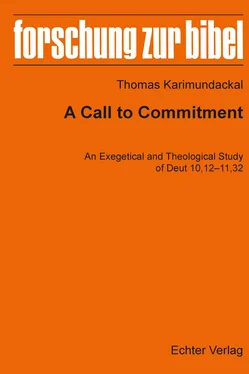• The land in ch. 11 is characteristically described as Yhwh’s gift to Israel (4] נתןx] 11,9.17.21.31) in tune with his promise to the fathers (11,9.21 אשׁר נשׁבע יהוה לאבתיכם; cf. 11,25 כאשׁר דבר לכם). Ch. 12 recalls once again that the land is Yhwh’s gift to their fathers (בארץ 12,1 אשׁר נתן יהוה אלהי אבתיך לך; cf. 12,20 כאשׁר דבר־לך ;12,1.9.10 נתן). Similarly, the acquisition of the land in ch. 11 (6] ירשׁx] 11,8.10.11. 23.29.31) is solely Yhwh’s initiative and a consequence of Israel’s obedience to the commandments. Ch. 12 stresses again that the possession of the land (12,1.2.29 ירשׁ) is Yhwh’s generous gift (12,1 נתן. 9.10) and a result of their execution of Yhwh’s command to destroy all the places of pagan worship (12,2.3).
• Deut 11,16.28 show the ever-present danger of Israel being seduced (פתה v16) by other gods and their tendency to turn aside (סור v16.28) from the ways of the Lord, by serving other gods (עבד v16), and worshiping them (ללכת אחרי אלהים אחרים ;11,16 והשׁתחויתם להם 11,28). Ch. 12 makes this clear and warns Israel against their continual tendency to be ensnared to follow them (תנקשׁ אחריהם v30) and to inquire (דרשׁ v30) about their gods (12,2.3.30.31 2xאת־אלהיהם), how they have served them (עבד v30) with the intention of imitating them (ואעשׁׂה־כן גם־אני v30). Therefore, Israel is asked to destroy (אבד 12,2.3) all their religious sites and objects (v2-3).
• Deut 11,23 makes it explicit that it is the Lord who drives out (ירשׁ hiphil) all the nations (11,23 את־כל־הגוים) and assures Israel that they will dispossess (ירשׁ qal) nations greater and mightier than themselves (11,23 וירשׁתם גוים גדלים ועצמים מכם). Deut 12,29 repeats this assurance of Yhwh’s cutting down (כרת) of the nations (12,29 הגוים; cf. 12,2.30) and Israel’s dispossession of them (ירשׁ qal 2x). In 12,2 “nations” are described as those nations that Israel will dispossess (12,2 אשׁר אתם ירשׁים אתם את־אלהיהם).
• The motif of long life in the land (;11,9 ולמען תאריכו ימים על־האדמה 11,21 למען ירבו ימיכם וימי בניכם על האדמה) could be seen in the assertion to live all the days upon the earth in 12,1 (כל־הימים אשׁר־אתם חיים 12,1 על־האדמה). Similarly, the motif “for your good” (10,13 לטוב לך) is reflected in the twice repeated affirmation “that all may go well with you” (12,25.28 למען ייטב לך).
• The grain, the most and the oil (11,14 דגנך ותירשׁך ויצהרך) are gifts of Yhwh’s blessing. Therefore, the Israelites must bring their tithe to the place the Lord will choose and they shall not eat them within their towns (12,17).
• The motif of eating (12,15 2xאכל.16.17.18.20.21.22.23.24.25.27) in ch. 12 could be seen as an extension of Yhwh’s blessing of food, for eating (אכל) and for being satiated (שׁבע) in 11,5.
Thus, there are many close thematic and verbal connections between 10,12-11,32 and 12,1-13,1. Therefore, considering the continuity in the communication, the bridging role of 11,29-12,1 and various common motifs, we can conclude that 10,12-11,32 is organically related to 12,1-31 both literarily and theologically.
2.2.2 Distinguishing characteristics of Deut 12,1-13,1
The following considerations help us to distinguish Deut 10,12-11,32 from Deut 12,1-31, although they are connected by the common elements listed above.
a) Change of place: The emphasis on Yhwh choosing the place (המקום) for his name in ch. 12 (12,5.11.14.18.21 אשׁר־יבחר יהוה אלהיכם המקום. 26) marks a transition from המקום of 11,5 (Moab, cf. 1,5), 53i.e. from the place of decision of the people to the place Yhwh will choose ( 54(בחר to put his name. In addition to this, we see an immediate spatial change from 11,29-32 to 12,1-3. Deut 11,29-32 are directed toward the ritual performance of the blessing on Mount Gerizim (29 על־הר גרזיםd) and the curse on Mount Ebal (29 על־הר עיבלd) 55when they cross the Jordan (31 ירדןa) to possess the land (31 ארץb). In 12,1-3 Israel is asked to demolish all the cultic places (המקום) of the nations (12,2) when they possess the land. 56
b) Change of time: There is a consistent concern to draw attention to the decision that Israel makes “now” and “today” in 10,12-11,32 (11.2.4.8.13.26.27.28.32 ;10,13.15 היום ;10,12.22 ועתה), which is almost absent in 12,1-13,1. 57Although, there is a future orientation in ch. 12, it is different from the pervasive future sense in ch. 11. In ch. 11 it focuses on the arrival and possession of the land (11,8-17), the instruction of the commandments to the future generations, the con- quest of the land (11,18-25), and the enactment of the ritual ceremony of blessing and curse on Mount Gerizim and Mount Ebal when they possess the land (11,26-32). However, the future envisaged in ch. 12 shows further progressive elements of their life in the land. While 12,1 (cf.12,19) assures life in the land all the days that they live upon the earth, v10.20.29 bring three distinctive future moments of their life in the land through the agency of Yhwh, such as rest from all their enemies (12,10), enlargement of the territory of their land (12,20) and the dispossession of the nations before them (12,29). Thus, in 12,1-31 Israel is asked to bring their offering to the place which the Lord will choose when they enjoy rest from all their enemies (12,10), when Yhwh enlarges the territory of their land (12,20) and when Yhwh cuts off the nations before them (12,29). 58
c) Change of characters: Although we do not see a change of the major characters from 10,12-11,32 to 12,1-13,1 the repeated mentioning of “nations” (הגוים) and “their gods” (אלהיהם) in 12,2-4.29-31 gives a new focus in ch.12.
d) Change of theme and genre: The hortatory teaching in 10,12-11,32 is changed into specific stipulations 59introduced by החקים והמשׁפטים in 12,1. 60The noticeable change in vocabulary also suggests a new phase of narration, for example, vocabulary related to the chosen place (v5.11.13.14.18.21.26), sacrifice (v6.11.13.14.27), votive offerings (v11.17.26) and non-sacrificial slaughter and meals (v15.16. 20-25), Canaanite religion (v2-4.29-31) etc. We also see a thematic progression in the chapter, such as the centralization of the cult: you shall seek and go to the place which the Lord will choose (v5) → you shall bring there all that I command (v11) → you shall bring there all that I command and offer there your burnt offerings (v14) → you shall eat and rejoice there before the Lord (v18) → you shall come there with holy things (v26). 61
e) Ch.12 begins with a formal asyndeton (12,1 אלה) which is characteristic of a new beginning (cf. 1,1; 4,44-45; 12,1; 28,69). 62
f) Change of style:
Frequent repetitions mark the style of ch. 12, e.g., “the place Yhwh your God will choose” 12,5 המקום אשׁר־יבחר יהוה אלהיכם. 11.14.18.21.26 63; “You shall bring there” 12,5.6.11 והבאתם שׁמה. 26; “rejoice before your God” 12,7.12 ושׁמחתם לפני יהוה אלהיכם. 18; 64“you shall not do” 12,4.8.31 לא־תעשׁון; “you shall keep to do” 13,1 ;12,1 תשׁמרון לעשׁות; “that it may go well with you” ייטב 12,25.28 לך למען; “you shall not eat the blood …” הדם לא תאכלו 12,16.23.24.27; “you shall (not) eat” 12,15 2xאכל.16.17.18.20. 21.22.23.24.25.27; “your sons and your daughters…” אתם 12,12.18 ובניכם ובנתיכם; “the unclean and clean” הטמא והטהור 12,15.22; “you shall offer your burnt offerings” תעלה עלתיך 12,13.14; “your burnt offerings and your sacrifices” עולתיכם 12,6.11 וזבחיכם. Thus, the repetitive style in ch. 12 can be identified as: prohibition (v4.8-9.13.16-17.23-25); requirement for centralization (v5-6.10-11.14.18.21.26); invitation to eat and rejoice before the Lord (v7.12.18); concern for inclusiveness (v7.12.18.19); sacrifice and offerings (v6.11.14.17). Some of the elements of v13-19 are duplicated in v20-28: permission → v15 and 20-22; prohibition → v16-17 and 23-25; command → v18 and 26-27; persuasion → v19 and 28.
Читать дальше












